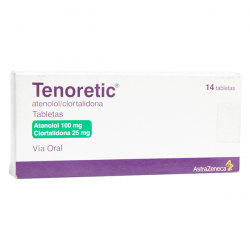Tenoretic (atenolol/chlorthalidone) Coupons, Discounts & Cost
Tenoretic is a combined antihypertensive drug with long-term effects. One way to save money on the Tenoretic retail cost regardless of income and insurance status is to use Tenoretic coupons or discount cards from RXCoupons. Use this Atenolol/Chlorthalidone coupon at this online pharmacy and receive up to 75% off the sale price.
Tenoretic pharmacological properties
Tenoretic is a combined antihypertensive drug with long-term effects. This drug contains two active ingredients - atenolol and chlorthalidone. Atenolol lowers heart rate, reduces high blood pressure. Chlorthalidone is a diuretic that reduces the level of Na+, Cl-, K+, Mg2+ and water.
Tenoretic is prescribed for patients with hypertension. It is not used if you have bronchial asthma, hypersensitivity to atenolol/chlorthalidone, as well as II or III degree AV block. This drug is also contraindicated in pregnant and lactating women.
How to take Tenoretic
Take 1 tablet a day (in the morning). 1 table per day will give a satisfactory result in most patients. Further reduction in blood pressure is insignificant with higher doses. If necessary, other hypotensive drugs (for example, vasodilators) may be additionally prescribed.
Older people often require a lower dose. This drug is not recommended for children. Care should be taken when treating patients with renal insufficiency: the dose of the drug should be reduced.
Store the tablets in dry, dark place, at a temperature of no higher than 25° C.
Tenoretic side effects and contraindications
You should not take Tenoretic if you have II or III degree AV block, CHF (when cardiac glycosides are ineffective), bradycardia, cardiogenic shock, hepatic or renal failure, bronchial asthma. It is not recommended for pregnant and lactating women, as well as for children.
It is better to avoid Tenoretic in case of I degree AV block, chronic bronchitis, emphysema, gout, fluid and electrolyte disorders.
Tenoretic can cause side effects such as bradycardia, AV block, heart failure, asthenia, nausea, constipation or diarrhea, dizziness, sleep disturbances, hypokalemia, hypercalcemia, hyponatremia, hyperuricemia, skin itching, skin hyperemia, dyspnea, bronchospasm, thrombocytopenia, neutropenia, excessive sweating. Overdose symptoms may include severe bradycardia, arterial hypotension.
Side effects of atenolol and chlorthalidone:
Cardiovascular system and blood: bradycardia, AV block, heart failure, thrombocytopenia, neutropenia.
Nervous system: asthenia, dizziness, sleep disturbances, visual impairment.
Gastrointestinal tract: nausea, constipation or diarrhea.
Other reactions: hypokalemia, hypercalcemia, hyponatremia, hyperuricemia, dyspnea, bronchospasm, decreased potency, excessive sweating.
Side effects of atenolol:
Nervous system: fatigue, weakness, dizziness, headache, drowsiness or insomnia, nightmares, depression, anxiety, short-term memory loss, hallucinations, convulsions, conjunctivitis.
Cardiovascular system and blood: bradycardia, palpitation, AV block, arrhythmias, weakened myocardial contractility, heart failure, hypotension, vasculitis, chest pain, thrombocytopenia, agranulocytosis.
Digestive system: nausea, vomiting, abdominal pain, diarrhea, constipation, impaired liver function.
Respiratory system: dyspnea, bronchospasm.
Allergic reactions: itching, rash, erythema, urticaria.
Other reactions: reversible alopecia, hyperhidrosis, myasthenia gravis, impotence, Peyronie's disease, hypoglycemia.
Side effects of chlorthalidone:
CNS: dizziness, vertigo, headache, paresthesia.
Cardiovascular system and blood: orthostatic hypotension, arrhythmia, thrombocytopenia, leukopenia, agranulocytosis, eosinophilia, aplastic anemia.
Digestive system: anorexia, nausea, vomiting, constipation, diarrhea, jaundice, pancreatitis.
Allergic reactions: photosensitivity, rash, hives, toxic epidermal necrolysis.
Other reactions: hyponatremia (accompanied by neurological symptoms - spasms and convulsions, fatigue, irritability), hypokalemia (dry mouth, thirst, irregular heartbeat, mood changes, spasms or pain in the muscles, nausea or vomiting, weakness), hypomagnesemia, hypercalcemia, hyperuricemia, hyperglycemia, glucosuria, hyperlipidemia.
Special instructions for Tenoretic
Vitamin K should be additionally prescribed in case of long-term treatment.
Reduce the dose gradually (within 7-10 days) if you need to stop Tenoretic therapy.
Do not take Tenoretic at least 48 hours before surgery with general anesthesia.
It is possible to use beta-2-adrenostimulants in case of bronchial obstructive syndrome.
Elderly people should not use drugs containing combination of atenolol and chlorthalidone (high risk of negative side effects). Therefore, Tenoretic is not recommended for people over 60 years of age.
Tenoretic interactions
Tenoretic increases the concentration of lidocaine.
Cimetidine increases the bioavailability of atenolol.
Tenoretic should be used with caution with NSAIDs and estrogens (the hypotensive effect may be lower).
Try to avoid simultaneous administration with verapamil, diltiazem, digoxin, amiodarone, antiarrhythmic and anesthetic agents.

